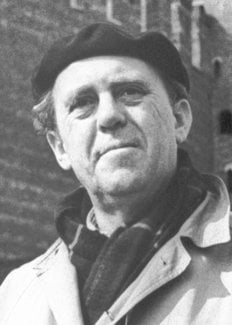Heinrich Böll
Biographical

I was born December 21, 1917 in Cologne, on the Rhine, the son of the sculptor and cabinet-maker, Viktor Böll, and his wife, Maria, née Hermanns. Between 1924 and 1928 I attended elementary school in Köln Raderthal, and from 1928 to 1937, the state-run Kaiser-Wilhelm classical secondary school in Cologne. In spring 1937 I began as an apprentice bookseller (publishers, retail trade, antiquarian) for the Matth. Lempertz company in Bonn. I left this apprenticeship in spring 1938, started my first attempts to write, gave private lessons, read a great deal. During autumn 1938 I was conscripted into the national labour service, and released in spring 1939 after completing a six-month term of compulsory service. Because the completion of labour service was a precondition for permission to study at the university, I was able to begin my studies of Germanistics and Classical Philology during the summer term of 1939. Late in the summer of 1939 I was conscripted into the German Army shortly before the outbreak of the war. I took part in the Second World War; in autumn 1940, briefly in France, from 1941 to 1942 (after a severe case of typhus), in the replacement units in Germany, from early 1942 until summer 1943, along the English Channel coast in France, between summer 1943 and autumn 1944, in the Soviet Union, Romania and Hungary, from spring 1945 on, for a few weeks in western Germany, where I was taken prisoner by the Americans, and interned until October 1945 in a camp in France, and then for a few weeks in October/November 1945, in an English camp in Belgium.
As early as December 1945, I accompanied my wife and a few relatives in their return from evacuation in the countryside to Cologne, where over the years we settled down in a destroyed house. I started to write again, while simultaneously working on repairing the destroyed house, I started my studies again – merely formally, because proof of occupation was necessary to obtain a food rationing card. From 1946 to 1949 I published short stories, and in 1949 my first book, a novella, called Der Zug war pünktlich, was published. After a first invitation to a meeting of the “Gruppe 47” in 1951, I met many German postwar writers with whom I afterwards became friends. I owe particular thanks, and hereby give them, to Hans Werner Richter, Alfred Andersch and many others that I cannot name in detail. Even if there occurred brief or permanent controversies during, or after, these meetings, the Gruppe 47 liberated many German authoresses and authors out of their isolation in a destroyed and fragmented postwar Germany. In 1942 I married Annemarie Cech, who has been irreplaceable, not only as my wife and companion, and not only as fellow experiencer and fellow sufferer in the fascist drama during the Nazi reign in Germany, but also for her critical awareness for language.
Our first child, Christoph, died in October 1945. Our sons Raimund, René and Vincent were born in 1947, 1948 and 1950 in the rubble of Cologne and grew up there.
Between 1950 and 1951 I worked as a temporary employee in the Cologne Bureau of Statistics. From summer 1951 on I have lived as a freelance writer with a fixed postal address in Cologne, but with a continually shifting place of work.
This autobiography/biography was written at the time of the award and first published in the book series Les Prix Nobel. It was later edited and republished in Nobel Lectures. To cite this document, always state the source as shown above.
Heinrich Böll died on July 16, 1985.
Nobel Prizes and laureates
Six prizes were awarded for achievements that have conferred the greatest benefit to humankind. The 12 laureates' work and discoveries range from proteins' structures and machine learning to fighting for a world free of nuclear weapons.
See them all presented here.
